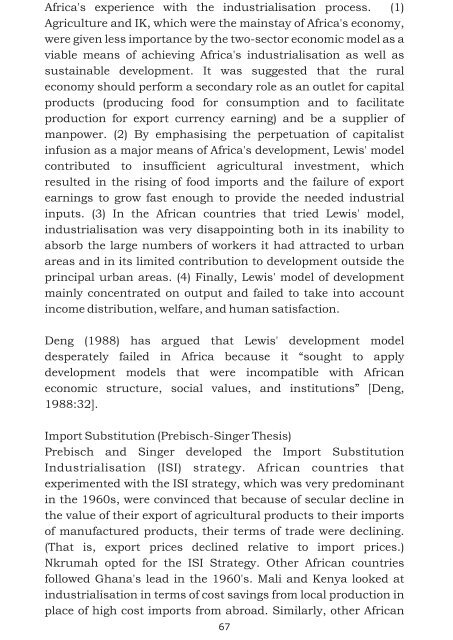Beneficiaries are actors too.pdf - Southern Institute of Peace ...
Beneficiaries are actors too.pdf - Southern Institute of Peace ...
Beneficiaries are actors too.pdf - Southern Institute of Peace ...
Create successful ePaper yourself
Turn your PDF publications into a flip-book with our unique Google optimized e-Paper software.
Africa's experience with the industrialisation process. (1)<br />
Agriculture and IK, which were the mainstay <strong>of</strong> Africa's economy,<br />
were given less importance by the two-sector economic model as a<br />
viable means <strong>of</strong> achieving Africa's industrialisation as well as<br />
sustainable development. It was suggested that the rural<br />
economy should perform a secondary role as an outlet for capital<br />
products (producing food for consumption and to facilitate<br />
production for export currency earning) and be a supplier <strong>of</strong><br />
manpower. (2) By emphasising the perpetuation <strong>of</strong> capitalist<br />
infusion as a major means <strong>of</strong> Africa's development, Lewis' model<br />
contributed to insufficient agricultural investment, which<br />
resulted in the rising <strong>of</strong> food imports and the failure <strong>of</strong> export<br />
earnings to grow fast enough to provide the needed industrial<br />
inputs. (3) In the African countries that tried Lewis' model,<br />
industrialisation was very disappointing both in its inability to<br />
absorb the large numbers <strong>of</strong> workers it had attracted to urban<br />
<strong>are</strong>as and in its limited contribution to development outside the<br />
principal urban <strong>are</strong>as. (4) Finally, Lewis' model <strong>of</strong> development<br />
mainly concentrated on output and failed to take into account<br />
income distribution, welf<strong>are</strong>, and human satisfaction.<br />
Deng (1988) has argued that Lewis' development model<br />
desperately failed in Africa because it “sought to apply<br />
development models that were incompatible with African<br />
economic structure, social values, and institutions” [Deng,<br />
1988:32].<br />
Import Substitution (Prebisch-Singer Thesis)<br />
Prebisch and Singer developed the Import Substitution<br />
Industrialisation (ISI) strategy. African countries that<br />
experimented with the ISI strategy, which was very predominant<br />
in the 1960s, were convinced that because <strong>of</strong> secular decline in<br />
the value <strong>of</strong> their export <strong>of</strong> agricultural products to their imports<br />
<strong>of</strong> manufactured products, their terms <strong>of</strong> trade were declining.<br />
(That is, export prices declined relative to import prices.)<br />
Nkrumah opted for the ISI Strategy. Other African countries<br />
followed Ghana's lead in the 1960's. Mali and Kenya looked at<br />
industrialisation in terms <strong>of</strong> cost savings from local production in<br />
place <strong>of</strong> high cost imports from abroad. Similarly, other African<br />
67


